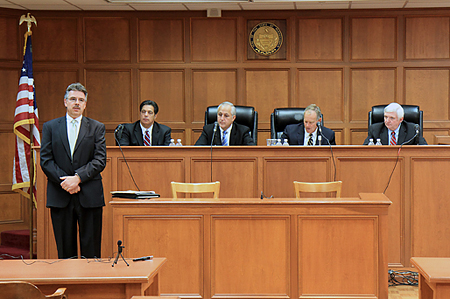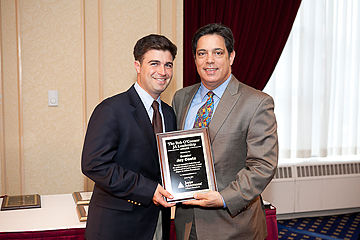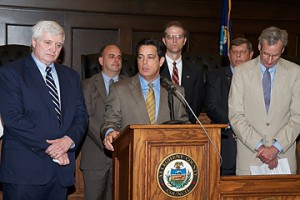Legislative Reapportionment Commission Hears Testimony

September 14, 2011 -- Duquense Law School Dean Ken Gormley (far left) welcomes participants to the public hearing conducted by the Legislative Reapportionment Commission.

September 14, 2011 -- Duquense Law School Dean Ken Gormley (far left) welcomes participants to the public hearing conducted by the Legislative Reapportionment Commission.
PITTSBURGH – September 13, 2011 -Senate Democratic Leader Jay Costa (D-Allegheny) joined members of the Senate Banking and Insurance Committee for a public hearing in Pittsburgh regarding the ongoing contract dispute between the University of Pittsburgh Medical Center (UPMC) and Highmark, Inc.
“It is unfathomable that UPMC and Highmark have yet to come to a compromise to settle their dispute,” Costa said. “This impasse is creating a great deal of anxiety, and these negotiations should not center on the financial benefits seen by these huge non-profits, but on the continued health and well-being of Highmark customers that rely on UPMC hospitals and doctors. The health of Pennsylvania residents and the availability of quality of health care is something we cannot afford to jeopardize.”
The 10-year reimbursement contract between Highmark and UPMC, which gives Highmark customers ‘in-network’ access to UPMC facilities, is due to expire next summer. A one-year ‘run-out’ period would follow the expiration.
Hearings are being held in an effort to gather information and determine whether or not there is any way in which the legislature can intervene to bring the current situation to an acceptable resolution.
Costa also joined Democratic and Republican House Leaders in July, urging Highmark President/CEO Dr. Kenneth Melani and UPMC’s President and CEO Jeffrey Romoff to keep the public interest and accessibility to quality care as their top priority in working toward agreement. (Read a copy of the letter here)
Michael Consedine, Pennsylvania’s Insurance Commissioner, testified at Tuesday’s hearing and provided the following contact information for consumers who are seeking further information or assistance. (Read his testimony)
The website is www.insurance.pa.gov.
The toll-free hotline is 877-881-6388.
According to Secretary Consedine, the agency will soon have a unit dedicated solely to health questions, and they are also in the process of creating a webpage devoted to clarifying the UPMC/Highmark contract dispute.
HARRISBURG, August 25, 2011 – Senate Democratic Leader Jay Costa (D-Allegheny) today announced the appointment of Gregory Fajt to the Pennsylvania Gaming Control Board. Fajt most recently served as the board’s chairman, appointed by Governor Ed Rendell in 2009.
“There were several factors to consider in making the appointment to the gaming board. Integrity and experience were at the top of the list,” said Costa. “There is no question that Greg Fajt has a great understanding of gaming issues, and his expertise has been an asset to the Commonwealth over the years. In additional to his vast knowledge of the industry, Greg has an outstanding reputation. His honesty and sound judgment were key factors in my decision.”
It was important to appoint a person knowledgeable of the myriad of issues associated with gaming, particularly as the board prepares to navigate a more competitive landscape, said state Sen. Wayne D. Fontana (D-Allegheny). Fontana is the Democratic chairman of the Community, Economic & Recreational Development Committee which has oversight of the administrative function of the Gaming Control Board and its regulatory oversight of the PA gaming industry.
“Now that Ohio has given the green light for casinos right across our state line, we can’t afford to lose Greg Fajt’s insight and input,” said Fontana. “We need to be mindful of how to best compete with bordering states and make sure Pennsylvania’s casinos are the preferred destination. Under Greg’s tenure as chairman, we have done that.”
The Pennsylvania Gaming Control Board implemented a number of changes and saw significant progress during Fajt’s tenure, including successful implementation of table games at nine casinos within six months of passage of Pennsylvania’s gaming law. Table games have generated $90 million in tax revenues in the past year alone.
Additionally:
· PA became the No. 1 gaming tax revenue producer in the United States. This benefits Pennsylvanians through increased tax revenue used for — among other things — property tax reduction.
· Casino jobs have continued to grow. Pennsylvania casinos now directly employ over 15,000 people providing needed jobs during the down-turned economy.
· Transparency of the Gaming Control Board has been increased through video streaming of public meetings.
· Significant cost-cutting initiatives have been implemented, including the reduction of the number of autos assigned to agency personnel and significant cut-backs in out-of-state travel by agency personnel as well as board members.
· Pennsylvanians saw the successful opening of the Rivers, Sands, and Sugarhouse casinos.
· The board maintained strong oversight of Pennsylvania casinos, issuing numerous fines to casinos that allowed under-age patrons to enter and gamble in their facilities.
Fajt is a licensed attorney within the Commonwealth of Pennsylvania and also a Certified Public Accountant (CPA).
“I will continue to work with my fellow board members to ensure that the oversight of Pennsylvania’s gaming industry is one in which other states can emulate,” said Fajt. “My commitment to maintain the integrity of the industry and the board is not taken lightly. Along with our dedicated staff, the board has made significant changes and will continue to make assessments. The ultimate goal is to make public confidence a priority and make sure Pennsylvanians continue to benefit from the industry’s profitability.”
Prior to his position with the board, Fajt served as chief of staff to Gov. Ed Rendell, the top advisor to the governor and manager of the day-to-day activities of the executive branch of state government, including 18 cabinet agencies and the Governor’s Office. Fajt joined Rendell’s senior staff in February 2007 as senior advisor, and prior to that served as Secretary of the Pennsylvania Department of Revenue from March 2003 through February 2007.
Fajt also served on several boards and commissions, including chair of the Pennsylvania Business Tax Reform Commission, the Taskforce for Working Families and the Economic Development Cabinet.
Fajt served as state representative for the 42nd District in Allegheny County from 1991 to 1996. During his tenure in the Pennsylvania Legislature, he focused on tax policy and economic development issues and served on the Finance, Judiciary, Professional Licensure and Tourism committees.
Before he joined the Rendell Administration, Fajt was a partner with Leech Tishman Fuscaldo and Lampl, LLC of Pittsburgh concentrating primarily in the areas of estate planning, and administration and corporate law. Fajt was also legal counsel for tax, corporate, and ERISA for Joy Technologies Inc., a Pittsburgh-based Fortune 500 company.
Fajt earned his law degree from Duquesne University in 1984, where the major emphasis of his studies was taxation. He graduated cum laude from St. Vincent College in Latrobe, Pa., with a Bachelor of Science in Accounting in 1977.
Fajt has a long history as a volunteer for many community and charitable organizations. He was named Big Brother of the Year for Allegheny County in 2002. He has also served on the Board of Directors for the Pittsburgh Blind Association, Beginning with Books, and St. Anne Home. He currently serves on the boards of ACHIEVA and the Burgess-McCormac Foundation.
The Pennsylvania Gaming Control Board is responsible for the regulatory and legal oversight of the gaming industry in the Commonwealth. Its mission is to protect the interest of the public by ensuring the integrity of legalized gaming through the strict enforcement of the law and regulations, the licensing of qualified individuals and entities, and fulfilling the objectives of limited gaming in the Commonwealth. The board is made up of seven members, three of whom are appointed by the governor, and four by the leadership of the General Assembly’s four caucuses.
###
PITTSBURGH – Sen. Costa recently received the Bob O’Connor JA Leadership Award for 2011 for his “exemplary leadership and profound impact” on Western Pennsylvania.
LEARN MORE
Junior Achievement of Western PA

Sen. Costa, right, is presented with the Bob O'Connor JA Leadership Award at Junior Achievement's annual meeting. Presenting the award is Corey O'Connor, son the late mayor.
Costa received the award earlier this summer at Junior Achievement’s annual meeting. The award is given to local legislators whose active support best resulted in the success of JA’s local chapter.
Presenting the award was Corey O’Connor, son of the late Mayor Bob O’Connor.
###
PITTSBURGH – Protecting access to good health care for residents is a top concern for regional lawmakers as the leaders and members of the General Assembly today urged Highmark and UPMC to get back to the bargaining table.
House Majority Leader Mike Turzai (R-Allegheny County), House Democratic Leader Frank Dermody (D-Allegheny County), Senate Democratic Leader Jay Costa (D-Allegheny County), and members from the three legislative caucuses met today in the Allegheny County Courthouse to discuss the dispute between the two health care agencies.
The members announced they sent a formal letter to the two entities to sit down with legislators to discuss the status of negotiations. Hearings will be held by the House Insurance Committee and the Senate Banking and Insurance Committee to determine what, if any, legislative or regulatory remedy is available.
“These are two huge community assets in western Pennsylvania, and we can’t sit on the sidelines as constituents are seriously worried about their ability to see a doctor,” Turzai said. “They need to work out these important issues without cutting off access to the quality health care.”
“Highmark and UPMC are two of our region’s largest employers and they are crucial parts of the health framework for thousands of Pennsylvanians,” Dermody said. “This public dispute is causing great concern to retirees, workers with families, and employers all over. We cannot shut the door on people’s access to doctors or hospitals. This fight needs to end.”
“We want to make certain the public’s interest is being served by these two major players in delivering health care to Western Pennsylvania. The public clearly won’t be served if health care access is limited, restricted, or disrupted in any way. That must be avoided,” said Costa. “No matter where people seek care — Hillman Cancer Center, West Penn Burn Center, Magee-Women’s Hospital or any of the other institutions that are so heavily relied upon – the public needs to be assured that the high level of care they have received in the past will not be impacted.”
UPMC is the region’s largest hospital and doctor network. Highmark controls 65 percent of the region’s health insurance market in western Pennsylvania, extending from the Pittsburgh region up north to the Erie area.
UPMC and Highmark are in the last year of a 10-year provider agreement, which allows Highmark members to see UPMC doctors and use UPMC hospitals; the contract ends June 30, 2012. Negotiations for a new contract broke off when Highmark began considering acquiring the financially troubled West Penn Allegheny Health System, a major UPMC competitor (West Penn Allegheny is the Pittsburgh region’s second largest hospital network).
Highmark has since reached a preliminary agreement to buy West Penn Allegheny, which prompted UPMC to end talks and open its network to other commercial insurance carriers.
If Highmark and UPMC do not reach an agreement, 2,700 UPMC doctors and affiliated hospitals will become out-of-network providers to approximately 3 million Highmark subscribers. Out-of-network fees are generally much higher than in-network doctors and hospitals, increasing out-of-pocket expenses for consumers.
###